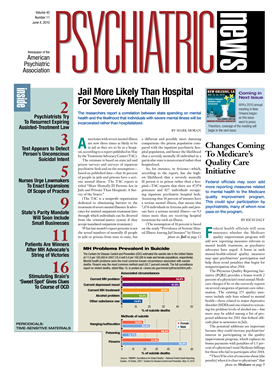In a concerted effort to reduce the incidence of suicide and untreated depression among young African-American adults, the federal government has joined forces with the Ad Council and a prominent author and mental health advocate to promote awareness and help seeking among this population.
The two-year campaign will reach target audiences with widely distributed print ads and brochures and several public-service announcements that will air on television and radio in the coming months. In addition, the campaign will be conducted over the Internet via a new Web site at <
www.storiesthatheal.samhsa.gov>. The site features short videos of African Americans who have struggled with depression over the course of their lives and have achieved recovery after seeking treatment for it.
The print materials include information about mental illnesses, emphasizing that they are common and treatable. The brochure encourages African Americans to support peers with mental illness and to encourage them to seek treatment.
“Depression is killing black people by the thousands,” said mental health advocate and author Terrie Williams, M.S.W., at the campaign's launch in late February at Howard University as part of a panel presentation broadcast over the Internet.
“It's important to talk about [depression], no matter what our personal fear might be. We must share our stories with each other, especially our young,” Williams said. “Now is the time to identify and name our pain—minus the myths and the stigmas—and seek the help so many of us need.”
Williams helped to develop the Internet videos and related campaign materials. She also serves as a campaign spokesperson. Williams cofounded the Stay Strong Foundation in 2001 to support African-American teens through a series of educational programs (Psychiatric News, December 5, 2008).
According to Annelle Primm, M.D., M.P.H., director of APA's Office of Minority and National Affairs, the mental health campaign “is a laudable effort that will chip away at the stigma associated with mental illness among African Americans. Stigma is a barrier that must be surmounted because of its relationship with delays in and unmet need for treatment of mental illness.”
She told Psychiatric News that unmet mental health needs among African Americans are associated with a number of undesirable outcomes, including poor physical health, premature death, and incarceration.
“Treatment could help to reduce the number of African-American children in the juvenile justice system and assist young people in reaching their educational and occupational goals. Since we know that mental illness is treatable, African Americans with mental illness, like other Americans, can benefit from treatment that can permit them to pursue their dreams and experience an optimal quality of life,” she noted.
According to the 2009 National Survey on Drug Use and Health, 6 percent of African Americans aged 18 to 25 had a serious mental illness in the prior year. However, only 58.7 percent of African Americans with serious mental illness received care within the prior year, according to survey findings.
The two-year campaign also includes a resource guide for psychiatrists, mental health professionals, mental health advocates, and others titled “Developing a Stigma Reduction Initiative.” APA district branches might find the guide useful for mounting a statewide antistigma campaign. Samples of outreach materials are included.
